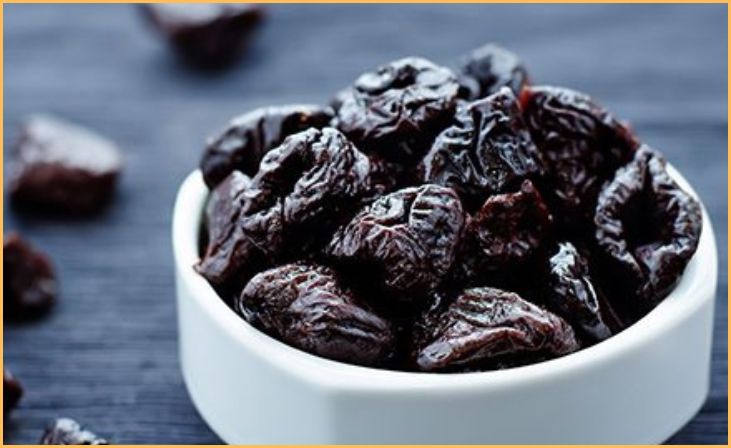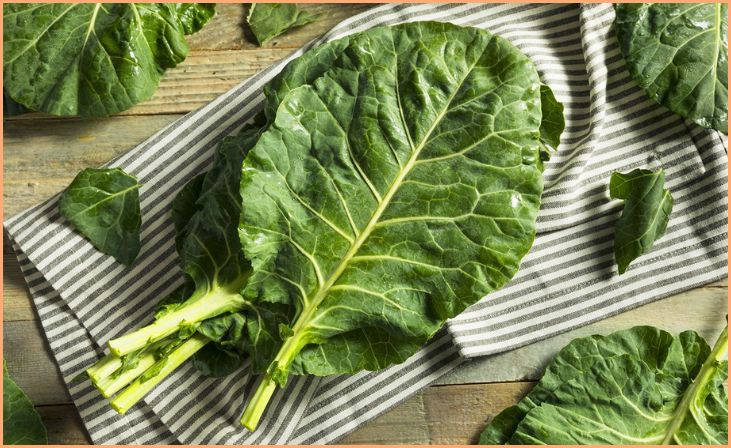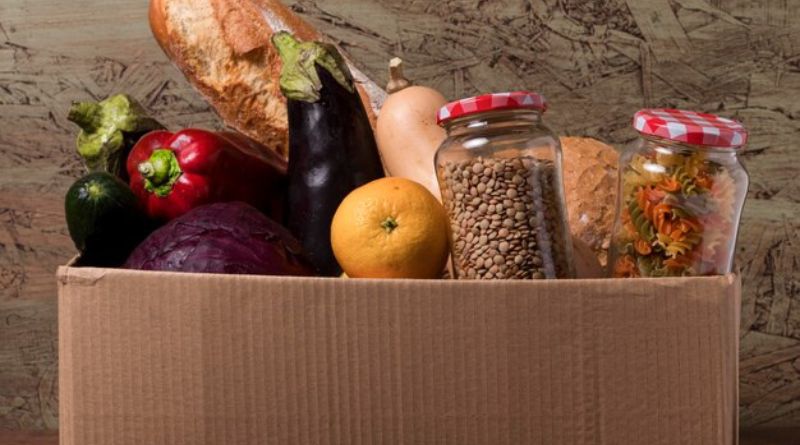Addressing constipation can indeed be an uncomfortable experience, but the beauty of nature lies in its ability to offer solutions. Within the realm of natural remedies, we discover a plethora of foods that act as steadfast allies in the pursuit of promoting bowel regularity. This article serves as a guide, unveiling the virtues of 10 such foods that seamlessly integrate into your daily diet, promising not just relief but also a path to a happier and healthier digestive system. Embrace these nutritional powerhouses, and let nature’s wisdom pave the way to smoother and more regular bowel movements.
Constipation Relief: 10 Foods That Will Get Things Moving
1. Prunes:

Prunes, dried plums, have long been revered for their natural constipation-relieving properties. They contain sorbitol, a sugar alcohol that acts as a mild laxative, softening the stool and promoting bowel movements. Additionally, prunes are rich in fiber, both soluble and insoluble, providing a dual-action approach to combat constipation. The soluble fiber helps absorb water, forming a gel-like substance that adds bulk to the stool, while insoluble fiber adds roughage, aiding in the movement of food through the digestive system. Consuming a few prunes daily or incorporating them into your diet can be an effective and tasty way to alleviate constipation.
Also Read:- Things to Know About Copper Cookware
2. Fiber-Rich Vegetables:
Broccoli, Brussels sprouts, and carrots are just a few examples of high-fiber vegetables. Fiber is crucial for maintaining digestive health as it adds bulk to the stool, making it easier to pass through the digestive tract. The insoluble fiber in these vegetables acts like a broom, sweeping waste and toxins through the intestines. Additionally, fiber promotes the growth of beneficial bacteria in the gut, contributing to a healthy digestive ecosystem. Including a variety of fiber-rich vegetables in your meals not only aids in preventing constipation but also supports overall gastrointestinal well-being.
3. Berries:
Berries, including raspberries, blackberries, and strawberries, are not only delicious but also potent allies against constipation. Packed with fiber and antioxidants, berries contribute to digestive health in multiple ways. The fiber content adds bulk to the stool, facilitating its movement through the digestive tract. Antioxidants, such as anthocyanins found in berries, possess anti-inflammatory properties that can soothe the digestive system. Including a colorful array of berries in your diet not only provides a sweet and nutritious treat but also supports regular bowel movements and overall gut health.
4. Kiwi:
Kiwi, a small but mighty fruit, offers a combination of soluble and insoluble fiber, making it a valuable addition to a constipation-relieving diet. The soluble fiber in kiwi absorbs water, forming a gel-like substance that softens the stool and aids in its passage. Additionally, kiwi contains an enzyme called actinidin, which helps break down proteins in the digestive system, promoting efficient digestion. The natural sugars in kiwi also act as a gentle laxative, further assisting in relieving constipation. Incorporating kiwi into your daily routine, whether eaten as a snack or added to smoothies, can contribute to a more regular and comfortable digestive experience.
5. Whole Grains:

Whole grains, such as oats, quinoa, and brown rice, are nutritional powerhouses that play a significant role in promoting digestive health. The high fiber content in whole grains adds bulk to the stool, preventing and alleviating constipation. Fiber also helps regulate bowel movements by promoting the rhythmic contractions of the intestines. In addition to fiber, whole grains provide essential nutrients like magnesium, which plays a role in muscle function, including the muscles of the digestive tract. By choosing whole grains over refined grains, you not only support digestive regularity but also provide your body with a rich source of vitamins, minerals, and antioxidants.
6. Watermelon:
Watermelon, a hydrating and refreshing fruit, can be a natural remedy for constipation. With its high water content, watermelon helps keep the body hydrated, which is essential for maintaining soft and easily passable stools. Dehydration is a common factor contributing to constipation, and incorporating water-rich fruits like watermelon into your diet can be an effective way to stay adequately hydrated. The fiber content in watermelon also contributes to digestive regularity by adding bulk to the stool. Enjoying slices of fresh watermelon or incorporating it into fruit salads are delicious ways to support hydration and promote a healthy digestive system.
7. Yogurt with Probiotics:
Yogurt, especially varieties containing probiotics, can be a beneficial addition to your diet for managing constipation. Probiotics are live bacteria that provide numerous health benefits, including maintaining a healthy balance of gut bacteria. A balanced gut microbiota is essential for optimal digestion and regular bowel movements. Yogurt with probiotics introduces these beneficial bacteria into the digestive system, promoting a supportive environment for overall gastrointestinal health. Including yogurt in your daily diet can help regulate bowel movements and alleviate constipation, providing a tasty and probiotic-rich option for those seeking natural digestive relief.
8. Beans and Legumes:
Beans, lentils, and chickpeas, collectively known as legumes, are nutritional powerhouses that offer both fiber and protein. While the high fiber content contributes to the prevention and relief of constipation, it’s essential to introduce legumes gradually to avoid excessive gas. Fiber in legumes adds bulk to the stool, promoting regular bowel movements and supporting digestive health. Additionally, the combination of fiber and protein in legumes helps create a feeling of fullness, which can contribute to weight management. Including a variety of legumes in your diet provides a diverse range of nutrients that not only aid in constipation relief but also contribute to overall well-being.
9. Flaxseeds:
Flaxseeds are tiny nutritional giants packed with both soluble and insoluble fiber. Adding flaxseeds to your diet can be an effective strategy for preventing and relieving constipation. The soluble fiber in flaxseeds absorbs water, forming a gel-like substance that softens the stool and promotes bowel regularity. Insoluble fiber adds bulk to the stool, aiding in its passage through the digestive tract. Flaxseeds also contain omega-3 fatty acids, providing additional benefits for heart health. Whether sprinkled on yogurt, added to smoothies, or incorporated into baked goods, flaxseeds offer a versatile and nutritious way to support digestive well-being.
Also Read:- Best Pans For Glass Cooktop
10. Leafy Greens:

Leafy greens, including spinach, kale, and Swiss chard, are nutritional powerhouses that contribute to digestive health in various ways. Rich in both fiber and essential nutrients, leafy greens promote the formation of soft and easily passable stools. The fiber content adds bulk to the stool, preventing constipation and supporting regular bowel movements. Leafy greens also contain magnesium, a mineral that plays a vital role in muscle function, including the muscles of the digestive tract. Including a variety of leafy greens in your diet provides a range of vitamins, minerals, and antioxidants, offering a holistic approach to digestive well-being and overall health.
Conclusion
Bid farewell to the troubles of constipation by wholeheartedly embracing a diet abundant in the aforementioned foods. Mother Nature, in her infinite wisdom, has generously bestowed upon us delectable solutions to alleviate digestive discomfort. It’s crucial to engrain a sense of consistency in your dietary choices, making these wholesome foods an integral and routine aspect of your meals. In doing so, you are not only fostering a more harmonious relationship with your digestive system but also ensuring that it expresses its gratitude through improved well-being. Your Healthy digestion will undoubtedly extend its thanks for your mindful and nourishing choices.
Frequently Asked Questions
A: While these foods can help, it’s essential to maintain a balanced diet with a variety of nutrients for overall digestive health.
A: Individual responses vary, but regularly including these foods in your diet should promote gradual improvement in bowel regularity.







